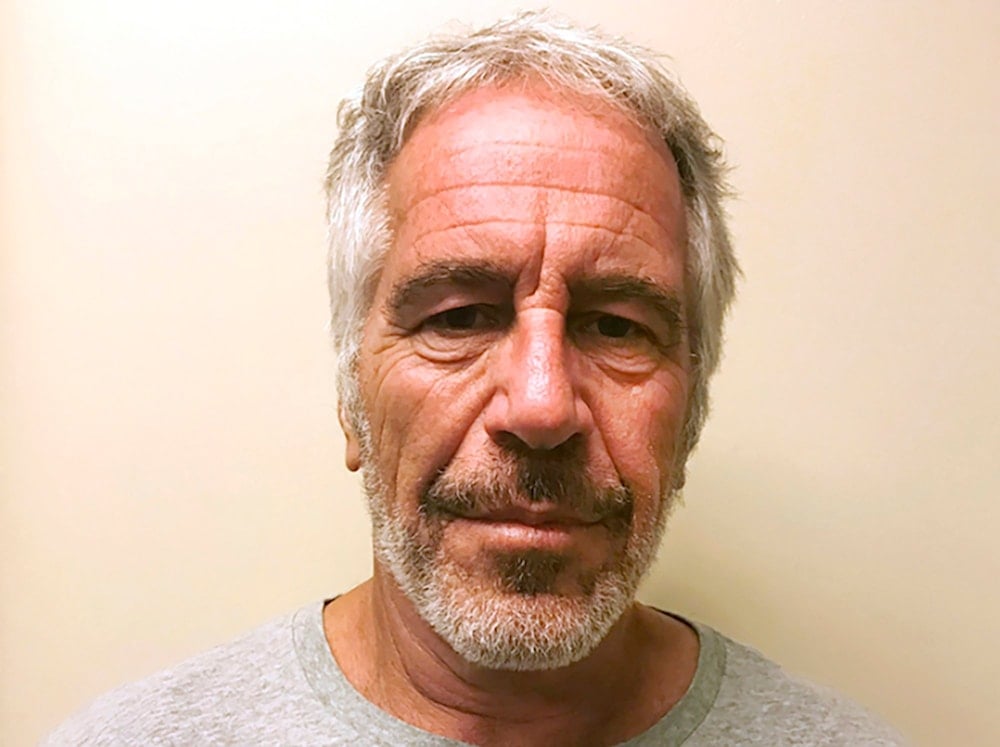Inside the Epstein-Rothschild web behind 'Israel’s' spy tech empire
Newly leaked documents and emails reveal Epstein’s deep involvement in financing Israeli cyber ventures through elite banking ties and secret political channels.
-

Jeffrey Epstein, on March 28, 2017 (New York State Sex Offender Registry via AP, File)
Newly released documents from the US House Oversight Committee, alongside looming legislation requiring further disclosures, have reignited media scrutiny of Jeffrey Epstein’s life. While much coverage has focused on his crimes and social networks, Epstein’s role in advancing "Israel’s" cyberweapons industry has remained largely underreported, until now.
On July 31, 2019, just eleven days before Epstein’s death in a Manhattan jail cell, attention turned to his connections with the Rothschild banking dynasty. Anonymous sources told Bloomberg that in 2015, Ariane de Rothschild, then-CEO of Edmond de Rothschild Group, visited Epstein’s New York mansion.
The Swiss private bank, one of Europe’s largest by assets under management, initially denied any link to Epstein. Four years later, after leaked calendars surfaced, the bank admitted de Rothschild had met Epstein in the course of her “normal duties at the bank between 2013 and 2019,” acknowledging his role in introductions to US finance leaders and law firms, as well as occasional advice on estate management.
Closer ties than disclosed
Newly released emails, however, reveal a closer personal relationship than previously disclosed, according to an investigative exposé by Drop Site. They show Epstein planning private trips and social engagements with de Rothschild, including a Broadway outing and a Montreal trip in 2014.
At the same time, documents from a hacked inbox of former Israeli Security Minister Ehud Barak, published by Distributed Denial of Secrets, indicate Epstein sought to leverage this relationship to finance Israeli cyberweapons startups. Barak recruited Pavel Gurvich, a former member of the Israeli Forces’ secretive Unit 81, to identify promising projects within "Israel’s" intelligence-linked tech sector.
Epstein often acted as a go-between, relaying messages between de Rothschild and Barak. In one email, he passed along an offer from the banker: “If Ehud wants to make serious money, he will have to build a relationship with me. take time so that we can truly understand one another.” Barak, deferring to Epstein on personal strategy, asked for advice, “I’m ready. But I need your advise re HOW? (ladies is your forté).”
It remains unclear whether Edmond de Rothschild Group ultimately funded the cyberweapons ventures directly, though in 2015, de Rothschild did negotiate a $25 million contract with Epstein’s Southern Trust Company, the same entity used to fund Barak’s intelligence-linked startup, Reporty Homeland Security (now Carbyne). The contract, according to Wall Street Journal reporting, covered “risk analysis and the application and use of certain algorithms.”
Building elite networks and donor-advised funds
Epstein and Barak maintained close communications throughout this period, frequently discussing regulatory and tax issues concerning Swiss banks. Epstein cultivated a relationship between Barak and de Rothschild, aiming to establish a donor-advised fund to finance Israeli technology sectors, including cybersecurity, telecommunications, and biotech. A donor-advised fund allows wealthy contributors to direct charitable contributions toward investments and grants of their choice, blending philanthropy with venture-style oversight.
Epstein had previously pitched similar structures to JPMorgan Chase and other European banks. He reassured Barak that influential figures in US intelligence, including former NSA director Michael Hayden and cyber commander Keith Alexander, were familiar with such setups. Barak, working with business partner Gary Fegel and Gurvich, explored opportunities to spin off Israeli intelligence technology into software startups, including offensive hacking tools and surveillance systems targeting cell phones, routers, and the Tor network.
Epstein links between Barak and de Rothschild
Throughout 2014, Epstein orchestrated meetings to solidify Barak and de Rothschild’s partnership, including dinners in New York and Paris. He coordinated Barak’s participation at "Israel’s" Herzliya Conference, an annual national security summit organized by the Interdisciplinary Center (IDC) Herzliya, linking him with de Rothschild’s philanthropic foundation. The foundation had historical significance in "Israel’s" founding and its ongoing investment in education and real estate development.
At the 2014 conference, de Rothschild promoted “venture philanthropy", advocating market-oriented approaches to charitable giving to attract younger diasporic donors. Epstein and Barak’s plans for a donor-advised fund mirrored these principles, seeking to channel private capital into Israeli cybertechnology initiatives. Epstein’s calendar shows he also scheduled a dinner between Barak and Peter Thiel, further cementing his role as a connector between elite financiers, politicians, and technologists.
Financial networks and regulatory awareness
Epstein and Barak closely monitored Swiss banking developments, particularly regarding money laundering and tax compliance. In 2015, Edmond de Rothschild bank entered a non-prosecution agreement with the US Department of Justice, paying $45 million to settle allegations of aiding US clients in concealing undeclared accounts. Barak congratulated Boris Collardi, CEO of Julius Baer, on a similar DOJ settlement concerning $600 million in undeclared Swiss accounts, reflecting their keen awareness of the legal landscape for cross-border finance.
By 2016, email correspondence indicates Epstein and Barak were still facilitating discreet meetings between de Rothschild and Collardi, exploring opportunities for strategic investments and cybertechnology funding. Later communications in 2017 suggest their plans remained active, with references to international diplomacy, showing the intertwining of finance, cyber capabilities, and political networks in Epstein’s orbit.
This reporting forms part of an ongoing investigation into Epstein’s global activities, including his connections to foreign intelligence services, most notably Israeli Mossad, and his role in advancing "Israel’s" surveillance and cybersecurity industries.

 5 Min Read
5 Min Read










